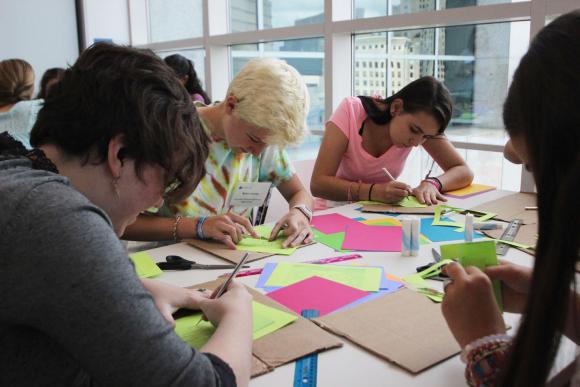PROVIDENCE, R.I. [Brown University] — Last week, rising 10th and 11th grade girls from all over Rhode Island came to Providence for a mathematics day camp at ICERM, Brown University’s math institute. The program, called GirlsGetMath@ICERM, aims to nurture girls’ interest in mathematics and keep them on track for careers in fast-growing and high-paying STEM fields.
“Mathematics opens the door to a huge variety of careers requiring quantitative skills, problem-solving, and the ability to deal with data,” said Jill Pipher, director of ICERM. “These careers range from healthcare to finance, from engineering to business, and are key to the nation’s economic future. In the United States, women are underrepresented in many of these careers, and some people believe that we are losing them at a very early stage in education.”
GirlsGetMath presents the power, beauty, and usefulness of math, making extensive use of interactive computer labs. Over the course of the week, 25 participating students learned about the cryptography that enables computers to securely exchange information, saw how math makes digital photography and image manipulation possible, and discovered the math behind fractals, the elegant geometric objects that can have finite area but infinite perimeter.
This is the second year for GirlsGetMath@ICERM. The organizers hope the program can be a template for similar programs throughout the country. Ultimately, they hope programs like this can start to close the gender gap for women in STEM fields.
According to the U.S. Department of Commerce, the percentage of science and engineering jobs held by women in 2009 stood at just 29 percent. But the gender gap is not just in STEM jobs. Women also tend to be underrepresented in banking, finance, and business. Math skills are key to all those professions, and keeping girls interested in math in their early high school keeps their options option.
“If we can keep young women interested in math in these formative years, we can keep them on track for these careers,” Pipher said.
GirlsGetMath@ICERM was funded and co-sponsored by Brown University, the Mathematics Association of America, through a grant, and the Phoebe Snow Foundation, a California-based nonprofit.

